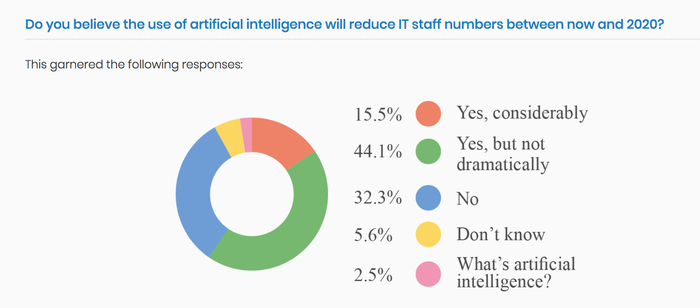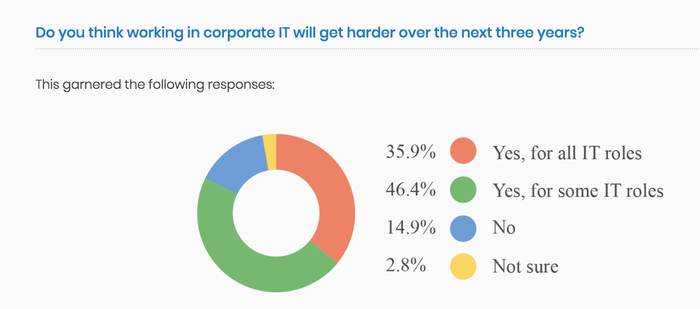Corporate IT is sweating, but not because of advancing technology.
Massive data breaches and the rise of the robots may make good headlines, but a new report shows that IT workers aren’t all that worried.
Overhyped trends?
The IT Service Management Future Readiness report, published by ITSM.tools and ManageEngine, polled more than 500 IT workers during the second quarter of this year to see what their everyday, real world concerns are, and the results were a bit surprising.
The survey was conducted fast on the heels of the massive AWS S3 outage that temporarily took down hundreds of sites including Airbnb, Docker, News Corp. and Slack. Considering the headlines, you might expect a high degree of skepticism about security in the cloud from corporate IT. But only eight percent of respondents said the incident negatively impacted their position on the public cloud, with another 24 percent reporting that it just “got them thinking” about cloud security risks.
That isn’t the only area the survey ran contrary to the news cycle. You’ve probably seen a lot of speculation about the impact of artificial intelligence (AI) on the IT space. Here on The VAR Guy, we’ve wondered if robots and AI will take your job and pointed to the millions of jobs that will be lost to AI in the next decade.
But the IT sector is taking it all in stride, according to the report. Forty-four percent of respondents said they weren’t dramatically worried about about the impact of AI on IT staffs in the next few years, and less than 16 percent of respondents were seriously concerned.

And all that noise the traditional channel has been making about not wanting to adjust for millennials? It turns out all the debate over remote work policies and millennials’ taste for rapid change hasn’t changed much about the IT department. Nearly half of those polled said they hadn’t done enough to meet the expectations of millennial talent, and 28 percent said they’d done nothing at all.
Disgruntled departments
While IT workers weren’t as concerned with cloud breaches or AI as the headlines might have you believe, a large portion of them weren’t all that happy with their position within their companies. When asked if they felt their personal efforts and business value were recognized by management, three-quarters of respondents expressed dissatisfaction. That doesn’t bode well for the morale of the industry.
What’s more, IT departments showed a great deal of pessimism about the outlook of their field. Eighty-two percent predicted some or all of IT roles would get harder over the next three years. If emerging tech like the cloud and AI aren’t causes for worry, and faith in corporate management is at rock bottom levels, then it stands to reason it’s a big shift in business models that has IT pros wringing their hands.

As has been discussed extensively, the rise of the line of business buyer is causing headaches for channel traditionalists. It turns out their corporate-employed cousins are equally dismayed at the role IT is playing in business tech spend these days. Seventy percent of those polled said their IT department hasn’t been sufficiently involved in their company’s DevOps activities, for example.
If IT is getting cut out, then it creates a gap channel partners should be rushing to fill. But traditional resellers and service providers may not offer the differentiation necessary to convince the C-suite to ditch the internal IT administrator for a partner. The results indicate that the channel won’t win on technology alone. Partners have to offer something the IT department currently doesn’t: business knowledge and vertical expertise.
‘Emerging channel’ partners such as digital agencies are rushing to scratch that itch, but they’re jumping off the starting line at a disadvantage. IT pros and legacy partners both have a distinct but narrowing window of opportunity to leverage their personal business relationships and subject matter expertise to cement their spot in the IT sector of the future.
“The ITSM industry is continually evolving in response to its micro and macro influencers, like technology, people, practices and government regulations,” said Rajesh Ganesan, Director of Product Management at ManageEngine. “Being aware of potential future challenges and opportunities helps ITSM professionals stay relevant and responsive to changing landscapes in IT and business, giving their organizations a competitive edge.”
That’s a piece of advice every partner should heed.
About the Author(s)
You May Also Like


